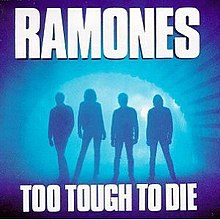Too Tough to Die
| Too Tough to Die | ||||||||||
|---|---|---|---|---|---|---|---|---|---|---|
 |
||||||||||
| Studio album by the Ramones | ||||||||||
| Released | October 1, 1984 | |||||||||
| Recorded | July 1984 | |||||||||
| Genre | Punk rock, hardcore punk | |||||||||
| Length | 36:13 (Original) 70:11 (Expanded Edition) |
|||||||||
| Label | Sire, Beggars Banquet | |||||||||
| Producer | Tommy Ramone, Ed Stasium | |||||||||
| Ramones chronology | ||||||||||
|
||||||||||
| Professional ratings | |
|---|---|
| Review scores | |
| Source | Rating |
| AllMusic | |
| Robert Christgau | A |
| Rolling Stone | |
Too Tough to Die is the eighth studio album by the American punk rock band the Ramones. It was released on October 1, 1984, and is the first Ramones record to feature Richie Ramone on drums. With ex-member Tommy Ramone producing, the recording process was similar to that of the band's 1976 debut album, Ramones. Likewise, the record's style—both lyrically and compositionally—saw the band returning to their roots. The photograph on the album cover, which features silhouettes of the band members, resulted from a "lucky accident" after photographer George DuBose's camera malfunctioned.
The album's overall style leaned toward that of hardcore punk and heavy metal music, rather than pop music which had been a focus of several of the band's previous albums. Too Tough to Die borrows upon elements such as guitar riffs from 1983's Subterranean Jungle. For the second time, after "Time Bomb" on Subterranean Jungle, bassist Dee Dee Ramone performs lead vocals on the album and receives vocal credits for two tracks. The album also contains the band's only instrumental piece, "Durango 95".
Critics appreciated the band's return to earlier methods of writing, recording, and production, noting they had strayed from the pop music genre. Despite critical acclaim, Too Tough to Die performed poorly in album sales. At this point in their career, the album was the band's lowest peaking record on the Billboard 200.
The recording of Too Tough to Die began in the summer of 1984 at the Media Sound Studios in New York City. The album's recording process used similar techniques which were used to record their 1976 eponymous album, with Rolling Stone's Kurt Loder describing it as "virtually live in the studio." The album marked the debut of new drummer Richie Ramone, who replaced Marky Ramone after he was fired for excessive drinking. The album's lyrics were written mainly by guitarist Johnny Ramone and bassist Dee Dee Ramone, while lead singer Joey Ramone did not participate in the process because he "wasn't feeling well" prior to recording. Joey did, however, write the lyrics for "Daytime Dilemma (Dangers of Love)" after receiving help with the guitar part by Daniel Rey. Johnny Ramone recalled:
...
Wikipedia
